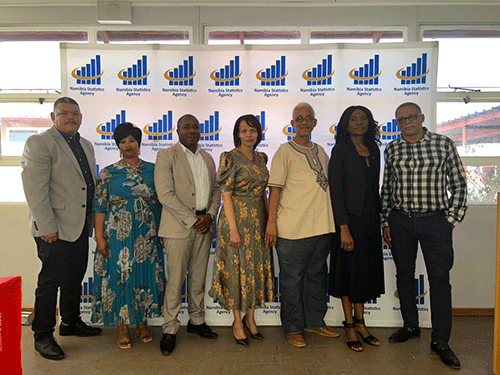KEETMANSHOOP – //Kharas governor Aletha Frederick said whenever you plan without data, you will either fail or not reach your set objectives.
She reasoned as such at a stakeholders’ engagement meeting on economic statistics hosted by the Namibia Statistics Agency (NSA) last week in Keetmanshoop. She said this could happen if one has not made use of the latest and most accurate statistics to base such planning on.
“It is said that good or reliable data has the essential feature of helping one to learn, which usually means that over time, you have to collect information in a similar fashion that is comparable from year to year,” Frederick noted. For that reason, statistics or data must be timeous to aid in fast decision-making, and the quality of these indicators must not be doubted.
«I am glad that although the NSA is challenged with financial constraints to conduct the census as expected, it remains committed to provide other economic, social, demographic and spatial data that is needed for development planning and monitoring purposes,” she said.
The governor furthermore urged the agency to continue lobbying for financial resources to carry out their mandate as the country needs statistics to attain success in its efforts to grow the economy.
“We are challenged as a country to address poverty, unemployment and inequality in our society, and to eradicate those three enemies, we depend on accurate data that is reliable to be used for planning and development purposes,” she stated.
Frederick added that without growing the country’s economy, leaders would fail to reduce poverty and unemployment. She also implored those present to use data to equitably allocate and distribute resources to break the cycle of inequality in communities.
“It will remain counterproductive to distribute or allocate resources equally to an unequal society,” she reasoned. The regional political head also warned that data must not be used to deny people access to basic and essential services.
Angeline Kamezuu, who studies economics at the Unam southern campus, said access to statistics is vital for her as it updates her continuously on the world’s economic indicators and the gross domestic product.
“I will furthermore always require accurate and reliable statistical data when doing research during my studies,” she added.
Also speaking to this publication was Tobias Linus, a basin support officer at the agriculture ministry, who observed that statistics are vital in one’s life and working environment.
“It guides us to make informed decisions towards improving the community’s livelihood, like for instance providing potable water. You will thus first need to know how many people are living in a given community,” he said.
– sklukowski@nepc.com.na



